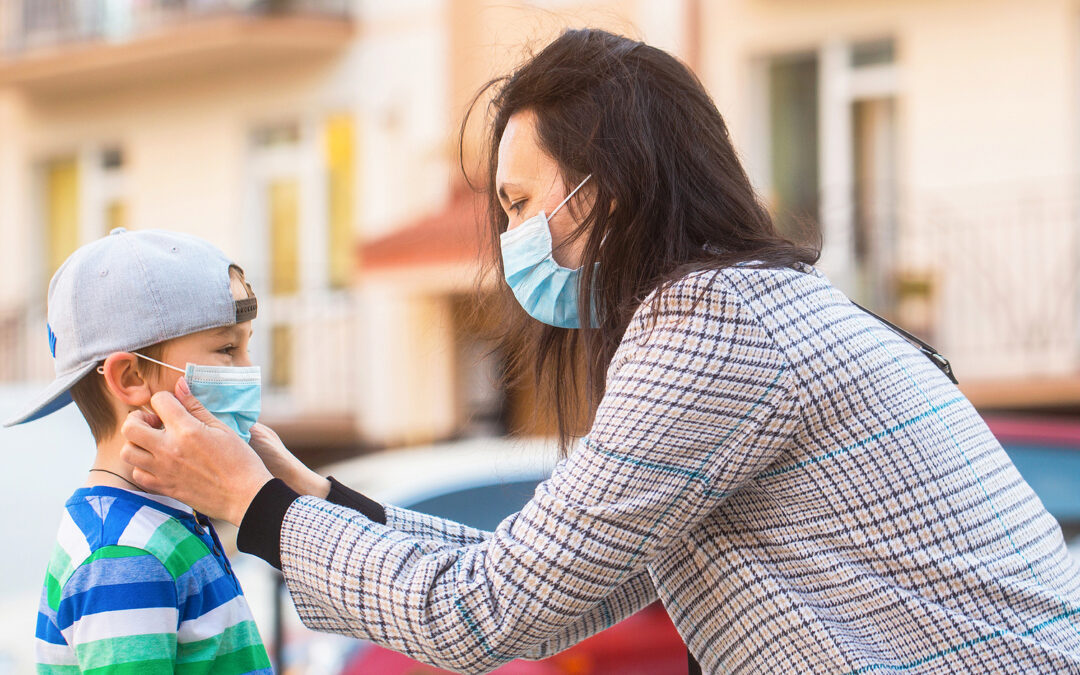Normal Worrying in Abnormal Circumstances
It was Adam Sandler’s character in the movie Spanglish who said: “Worrying about your kids is sanity.” If this statement resonates with you, take a big sigh of relief because this sentiment could not be more correct.
In fact, a certain degree of worrying is necessary to keep our children alive. Think about it… What if you didn’t cut up your toddler’s food into small pieces? Or what if you didn’t stack the pillows on the bed during nap time? And what’ll happen if you don’t bring the dusty first aid kit to the playground for what feels like the millionth unnecessary time? That sudden fearful fluttering in your stomach as you ask yourself “Are the pillows stacked high enough?” is an example of normal, adaptive anxiety. Adaptive anxiety helps us survive. In fact, it often motivates us to make changes that are beneficial to ourselves and the people we love.
Adaptive Anxiety & Parental Anxiety
Adaptively preparing for an undesired outcome is part of a parent’s job. So, you’re doing great in the parental anxiety area. But, how can we as primary care providers be expected to continue on in such unprecedented and dangerous times? The global COVID-19 pandemic has incontestably brought on a new wave of endless challenges. It’s hard for our children, for us, and our ability to prepare for undesired outcomes. In other words, we’re not just talking about stacking pillows anymore.
In the last thirteen months, we have collectively experienced an endless series of sudden and unexpected changes. We have lost, suffered, and grieved. Further, we have had more questions than answers. And if we did in fact receive a seemingly concrete answer, we were told to be wary of political manipulation.
In short, our nuclear future became unknown. So, how does this bleak but very real existence affect parental anxiety?
Prolonged adversity and uncertainty can have an exacerbating effect on normal, adaptive anxiety. Simply put, what used to feel manageable no longer does. There is no checking to make sure the pillows get stacked properly on the bed with this one. If you’re a sane parent, you’re going to worry. And in today’s world, new and experienced moms alike are taking on big worries that they are rightfully entitled to. So, how does worrying present itself? For many, it takes the form of an automatic thought that is as natural and instantaneous as breathing.
Parental Anxiety May Sound Like:
- “How will wearing a mask impact my child’s speech?”
- “Will this degree of isolation have a lasting impact on her/his social development?”
- “Will my children experience permanent anxiety?”
- “How can I make them feel safe in an unsafe world?”
Automatic Thoughts & Anxiety Treatment
The founder of Cognitive Behavioral Therapy (CBT), Aaron Beck, posits that experiencing such automatic and often intrusive thoughts is not the problem. But rather, the thoughts’ impact on your mood, behavior, and day-to-day functioning. We as clinicians are often faced with people who experience daily, distressing anxiety. So, a CBT-informed intervention requires putting automatic thoughts on trial.
We ask our clients to critically evaluate the thought’s legitimacy. Then, more often than not, there is little to no evidentiary support. If we try to apply the same principle to any of the pandemic-induced worries listed above, we’re inevitably going to come up short. Why? Because we’re lacking contradictory evidence to negate the worry. In every sense of the word, these are unchartered waters.
Anxious thoughts can have a snowball effect.
If you are able to have worrying automatic thoughts without experiencing feelings of tension and a gnawing urge to fix it, wonderful. But if you are like most of us, one worrying thought often leads to another should/could statement. Then before you know it, you have made an appointment with a speech pathologist, spent countless time reading article after article, and caught yourself up on theories of child development.
The key question then becomes “How can I as a parent worry ‘normally’ in abnormal circumstances?” Additionally, “How can I refrain from unhelpfully reacting to my rightful concerns?”
Parental Anxiety Tip #1: Take What You Can Control, Leave What You Can’t

When faced with a question that cannot be answered, we often become flooded with “what if” thoughts. And then we find ourselves in a helpless heap of panic. You may not be able to answer the question or solve the worry of the hour. But, you can prevent such thoughts from spiraling out of control.
Ground yourself. Take a moment to stop, close your eyes and take five purposeful breaths. Focus on the breath, feel it enter and exit your body. Gently take notice of your body and the sights, sounds, and smells of your environment.
This may seem too simple of a response to such a big worry. But rest assured, this is an effective mindfulness-based practice designed to calm your overactive fear-driven system down.
Parental Anxiety Tip #2: Recognize The Thought Without Identifying With It
Once we reduce the fear-driven overactivity down, we can evaluate our thinking and feelings more effectively. As stated above, fear naturally drives us to take action, but with the COVID-19 pandemic, taking action has morphed into a “ready, set, wait” response. The intensity of the fear leads us to believe that something can actually be done, which is just not the case.
When you begin to notice yourself worrying about unresolvable circumstances and feel that gnawing sense of urgency, stop and ask yourself “What story am I playing in my head?” If the storyline involves you miraculously changing, resolving, and fixing the unknown, then you’re identifying with a storyline that just simply hasn’t been written.
This may seem harmless, since to a certain extent, we all play out fictional, alternative narratives in our heads. But in the non-fictional world, we can often become disillusioned with the expectations we place on ourselves.
Parental Anxiety Tip #3: Lean In And Embrace Vulnerability
Remember, the root and heart of a parent’s worrying is love, which often gives rise to fear. Fear of loss, fear of the unknown, fear of pain. As a parent, there is no shame in this game, yet we often deal with such incredible vulnerability by shamefully going inwards.
By nervously trying to resolve and answer the unanswerable, we cut ourselves off from the world and people around us. Lean into that vulnerability by giving it a voice and connecting with your support systems. Alert the people closest to you that you’re feeling anxious. Don’t carry the world’s problems on your shoulders alone because you’re afraid of not appearing strong and able.

Thinking About Starting Anxiety Treatment in Baltimore, MD?
If you’ve found yourself dealing with unmanageable anxiety, we recommend considering anxiety treatment. Millions of Americans work with therapists to help them feel their best, so they can be the best parents and partners. Our anxiety therapists have worked with countless parents to help them manage anxiety and feel more grounded as a parent. If you’re interested or have any questions about anxiety treatment in Baltimore, MD, reach out to us here.
Other Therapy Services at New Connections
The expert therapists at our Baltimore, MD-based counseling center understand the true impact of parental anxiety. It affects your relationships with your kids, partner, and yourself. Our counselors offer services to help you be the best parent possible. We provide both men’s and women’s counseling, along with LGBTQ therapy. Further, our therapists provide EMDR for trauma therapy and PTSD treatment and therapy for sexual assault survivors.






